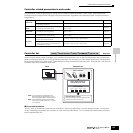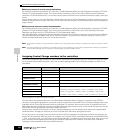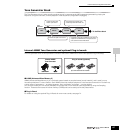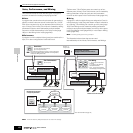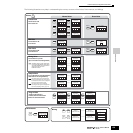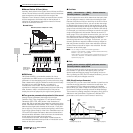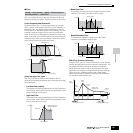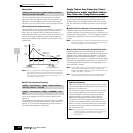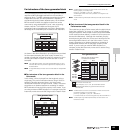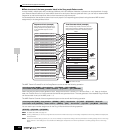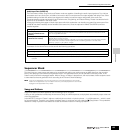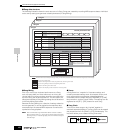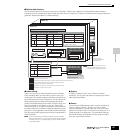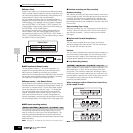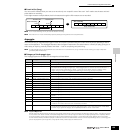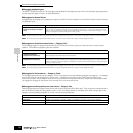
Internal Structure (System Overview)
163
Owner’s Manual
Basic Structure
Part structure of the tone generator block
This synthesizer plays the sounds in the tone generator block in
response to MIDI messages received from the controller or
sequencer block. The MIDI messages are assigned to sixteen
independent channels, and this synthesizer is capable of
simultaneously playing sixteen separate parts, via the sixteen
MIDI channels. However, the sixteen-channel limit can be
overcome by using separate MIDI “ports,” each supporting
sixteen channels. The multiple sound sources of this
synthesizer (internal tone generator and Plug-in Boards) take
advantage of the three MIDI ports included on the instrument.
As shown in the above illustration, up to 48 parts are provided
for the modes (excepting the Voice mode). However, the
number of parts that are actually used is a maximum of 34 in
the Song and Pattern modes, as we will see later in some
examples.
n The USB cable supports up to eight separate MIDI ports. The Tone
Generator block of this synthesizer supports three separate ports as
illustrated above.
n A single MIDI cable/connection cannot handle data over multiple MIDI
ports.
■ Part structure of the tone generator block in the
Voice mode
In this mode, a Voice is played from the keyboard, using a
single part. This part is used also when the Plug-in Voice is
selected. The tone generator block in the Voice mode
receives MIDI data over a single channel. Keep in mind that
song data on an external sequencer consisting of multiple
MIDI channels will not play back properly in this mode. If you
are using an external MIDI sequencer or computer to play the
instrument, make sure to use the Song mode or Pattern mode.
n The MIDI receive channel in the Voice mode can be set from the
following display in the Utility mode.
[UTILITY] → [F5] MIDI → [SF1] CH → BasicRcvCh
The MIDI port number which this synthesizer can recognize in the
Voice mode is 1.
n The Multi-Part Plug-in Board (PLG100-XG) cannot be used in the Voice
mode.
■ Part structure of the tone generator block in the
Performance mode
This mode lets you play a Performance (which multiple Voices
(parts) are combined – in a layer, or in other configurations)
using the keyboard. While a total of seven parts are available
in this mode (as shown below), a maximum of four parts can
be used simultaneously. Although this mode lets you play
several parts at the same time, all are set to receive over the
same single MIDI channel, as in the Voice mode. For this
reason, song data on an external sequencer consisting of
multiple MIDI channels will not play back properly in this
mode. If you are using an external MIDI sequencer or
computer to play the instrument, make sure to use the Song
mode or Pattern mode.
n The MIDI receive channel in the Performance mode can be set with
the following operation in the Utility mode.
[UTILITY] → [F5] MIDI → [SF1] CH → BasicRcvCh
In the Voice mode, the instrument recognizes only data over MIDI Port 1.
n The Multi-part Plug-in Board (PLG100-XG) cannot be used in the
Performance mode.
Port 1
Part 1
Part 2
Part 14
Part 15
Part 16
Port 2
Part 17
Part 18
Part 30
Part 31
Part 32
Port 3
Part 33
Part 34
Part 46
Part 47
Part 48
Tone Generator block
Parts used in modes other than the Voice mode
Part for Voice mode
Port 1
Part 1
Part 2
Part 3
Part 4
Part 5
Part 16
Port 2
Part 17
Part 18
Part 30
Part 31
Part 32
Port 3
Part 33
Part 34
Part 46
Part 47
Part 48
Tone generator block
Parts used in modes other than the Voice mode
Part for Voice mode
Parts 1-48 are not used.
PLG1 part
PLG3 part
PLG2 part
Port 1
Part 1
Part 2
Part 3
Part 4
Part 5
Part 13
Part 14
Part 15
Part 16
Port 2
Part 17
Part 18
Part 30
Part 31
Part 32
Part 46
Part 47
Part 48
Port 3
Part 33
Part 34
PLG1
PLG3
PLG2
Tone generator block
When three single part Plug-in boards
are installed to the synthesizer.
Parts 5-13 and 17-48 are not used.
These seven parts (1, 2, 3, 4, 14, 15, 16) are reserved for use in the
Performance mode; however, only up to four of them can be used
at the same time.



